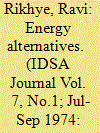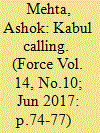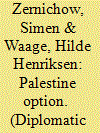| Srl | Item |
| 1 |
ID:
184571


|
|
|
| 2 |
ID:
154584


|
|
|
| 3 |
ID:
152135


|
|
|
|
|
| Summary/Abstract |
Vladimir Putin, the person and the president, is the wild card in Russian politics. After what could be a quarter of a century in power by 2024 (either as president or prime minister), Putin's departure could prove utterly destabilizing. Russia's principal political problem is determining who or what replaces Putin as the fulcrum of the state system in the decade ahead. This essay considers the question of whether “Putin's Russia” – a hyperpersonalized presidency supported by informal elite networks – can transform into a depersonalized system that is rooted in formal institutions with clear, predictable mechanisms to mitigate the risks of a wrenching presidential succession.
|
|
|
|
|
|
|
|
|
|
|
|
|
|
|
|
| 4 |
ID:
132012


|
|
|
|
|
| Publication |
2014.
|
| Summary/Abstract |
Were the Palestinians anything more than simply a refugee problem? Since the creation of the State of Israel in 1948, the USA had pretty much ignored this haunting question. However, as the Palestinian guerrillas' wide-ranging armed struggle seemed to be approaching a climax in 1970, U.S. policy makers were forced to reassess whether they might also need to view the Palestinian issue as a political problem. In April to May of that year, U.S. State Department officials began to doubt whether the Jordanian regime would survive the civil war then brewing in that country. In response, a strategy paper examining the possibility of a joint Jordanian-Israeli-Palestinian settlement-a policy that would come to be known as the "Palestine" or "Palestinian option"-was developed within the U.S. State Department. Between October and December 1970, the National Security Council discussed various versions of this strategy paper. At the same time, members of the main Palestinian guerrilla organization, Fatah, sent messages to the Americans indicating that they might be willing to enter into negotiations. Why, then, did these efforts fail to bring about a change in U.S. policy toward the Palestinians?
|
|
|
|
|
|
|
|
|
|
|
|
|
|
|
|